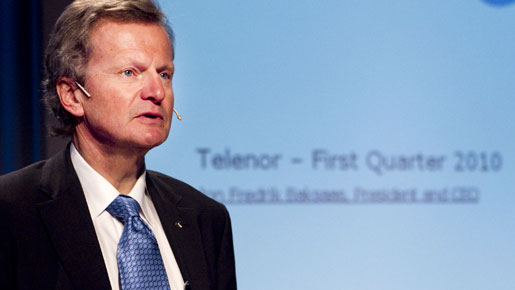
Is Telenor the biggest mobile operator you’ve never heard of? It could be for some. Whether that is down to the fault of its CEO, Jon Fredrik Baksaas is another matter. The company’s roots go right back to 1853 when Norway’s first Oslo telegraph cable connection was opened. Certainly Telenor is not short of clout. It has more than 172 million subscribers plus a widening portfolio of broadband and TV operations spread throughout mainland Scandinavia. It is reaching deep into Eastern Europe and Asia for new opportunities, extracting as much cross-synergy opportunity as it possibly can from a pretty fragmented, though highly dynamic, market.
Boss Jon Fredrik Baksaas appears to be relishing the job. The incumbent since 2002, the 56-year-old has broad operational experience. He joined Telenor back in 1989 having done his time in a variety of top financial positions at holding company Aker ASA and risk management company Det Norske Veritas. Originally Baksaas earnt an MSc in business admin from the Norwegian School of Economics and Business Administration in Bergen.
Under the radar
Perhaps the reason that many people – particularly in Western Europe – haven’t heard of Telenor is simply because it is increasingly focused on its Asian operations. And with good reason. Baksaas is simply continuing the strategy of building a base in Asia rather than battling it out with established European players. To do that job effectively – squaring up to the likes of Deutsche Telecom – would cost Telenor huge amounts of cash. That’s cash it hasn’t got.
Or is too sensible to spend. But even investing in Asia doesn’t come cheap. Baksaas is now stretching the brand from rural Bangladesh to Pakistan.
Of course, Telenor knows how to develop mobile-phone technology. Back in the late 1990s, it was largely Scandinavia that stole a march on the rest of Europe in popularising mobile phone take-up. Penetration levels of mobile use accelerated fast. Double, in fact, the pace of countries like Germany and the UK. So Telenor, which adroitly latched onto gem, the global standard for mobile operators, early on, carries a lot of useful know-how and baggage in developing a market from scratch. And Baksaas’ progress means Telenor has emerged as a small to medium-sized niche player to a fully-fledged business that the likes of China Mobile is having to look twice at before fully engaging with.
At its IPO in 2000, Telenor had a mobile subscriber base of 15 million. But by the end of the third quarter 2009 Baksaas had driven this to 172 million.
In terms of future direction, Baksaas is certainly sensibly keeping to his Asia focus. In fact, it’s probably the most crucial part of its overall portfolio, though the company still dominates in its home Norwegian market, despite intense competition (it still operates the national terrestrial broadcast network at home).
Baksaas’ strategy is not without risk. Building coverage in undeveloped rural areas is expensive. It’s estimated that building up this infrastructure in places like Pakistan and Bangladesh alone has cost the company more than €2.5bn in recent years. Baksaas is not expecting a quick return on shareholder cash, of course. Recovering immense investment is a long-wait game. Decades possibly.
But Baksaas has something of a diplomatic advantage. To state the obvious, Norway is not the US (or the UK).
There is little history of Norwegian imperial rule in rural Asia. Little cultural baggage attaches itself to the company.
There is one blemish Baksaas could do without however. Child labour accusations flew in 2008 when it was discovered that some Telenor suppliers in Bangladesh were using small children down the supply chain.
Accusations that Telenor should have ceded majority control to its Bangladeshi venture Grameenphone have also surfaced carrying some weight as they are backed by Nobel Peace Prize winner Muhammad Yunus. There are always crises for Western companies expanding Asia at break-neck speed; these incidents, it seems, are part of the price.
Certainly the Telenor Group started 2010 with a strong set of numbers says Baksaas. “Current trends in the Asian and Nordic regions are positive and I am pleased to see that the Telenor Group had a rebound in organic revenue growth. Operating cash flow,” he said, “was close to NOK 5bn due to a combination of strong financial results and good capital discipline.”
Baksaas has also been able to draw on the demand for smartphones such as the Apple iPhone and HTC Smart from the higher end of his subscriber base, particularly in Scandinavia. Despite the encouraging results Baksaas says he’s preparing to slash investment spending in readying the company for a stock buy-back programme. There’s also renewed concern that expansion into places like India remain highly competitive, with thinning margins. But Baksaas is playing a long game. An emerging middle class in Asia is rising. They will want to spend money. It will only be a matter of time.

